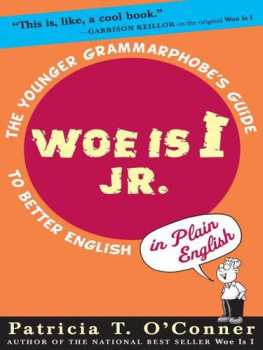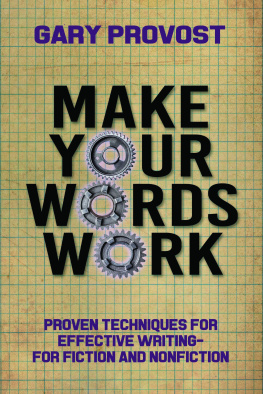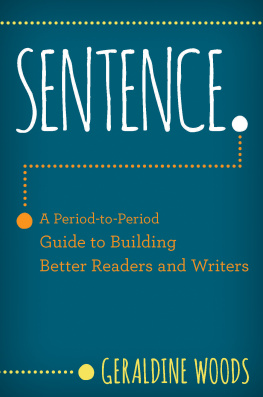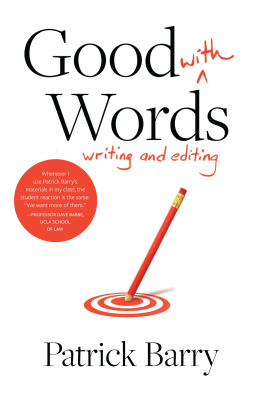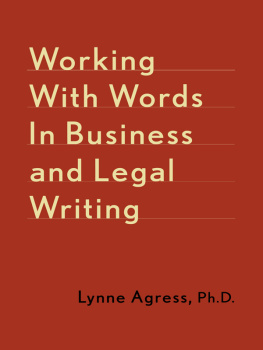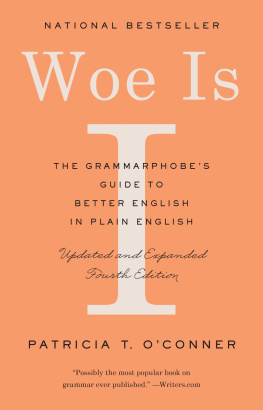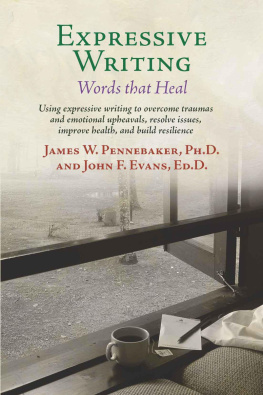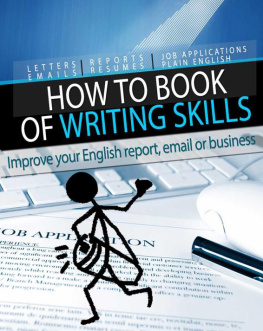A Harvest Book
Harcourt, Inc.
San Diego New York London
For my mother
Copyright 1999 by Patricia T. O'Conner
All rights reserved. No part of this publication may be reproduced
or transmitted in any form or by any means, electronic or
mechanical, including photocopy, recording, or any information
storage and retrieval system, without permission in writing from
the publisher.
Requests for permission to make copies of any part
of the work should be mailed to the following address:
Permissions Department, Harcourt, Inc.,
6277 Sea Harbor Drive, Orlando, Florida 32887-6777.
Library of Congress Cataloging-in-Publication Data
O'Conner, Patricia T.
Words fail me: what everyone who writes should know
about writing/by Patricia T. O'Conner
p. cm.
Includes index.
ISBN 0-15-100371-8
ISBN 0-15-601087-9 (pbk.)
1. Authorship. 2. Creative writing. 3. Report writing.
I. Title.
PN147.027 1999
808'.02dc21 99-25610
Designed by Lydia D'moch
Printed in the United States of America
First Harvest edition 2000
E D C B A
Contents
Acknowledgments vii
Introduction 1
Part 1
Pull Yourself Together
1. Is Your Egg Ready to Hatch? Know the Subject 9
2. "The Party to Whom I Am Speaking": Know the Audience 12
3. Get with the Program: The Organized Writer 17
4. Commencement Address: The First Few Words 26
5. From Here to Uncertainty: How Am I Doing? 35
Part 2
The Fundamental Things Apply
6. Pompous Circumstances: Hold the Baloney 49
7. The Life of the Party: Verbs That Zing 56
8. Call Waiting: Putting the Subject on Hold 60
9. Now, Where Were We? A Time and a Place for Everything 63
10. The It Parade: Pronoun Pileups 68
11. Smothering Heights: Misbehaving Modifiers 72
12. Too Marvelous for Words: The Sensible Sentence 87
13. Made for Each Other: Well-Matched Sentences 93
14. Give Me a Break: Thinking in Paragraphs 99
15. The Elongated Yellow Fruit: Fear of Repetition 105
16. Training Wheels: Belaboring the Obvious 108
17. Critique of Poor Reason: The Art of Making Sense 111
18. Grammar Moses: Thou Shalt Not Embarrass Thyself 117
19. Down for the Count: When the Numbers Don't Add Up 129
Part 3
Getting Better All the Time
20. Lost Horizon: What's the Point of View? 141
21. Wimping Out: The Backward Writer 149
22. Everybody's Favorite Subject: I, Me, My 155
23. Promises, Promises: Making Them, Keeping Them 165
24. You Got Rhythm: Writing to the Beat 171
25. The Human Comedy: What's So Funny? 180
26. I Second That Emotion: Once More, with Feeling 191
27. The Importance of Being Honest: Leveling with the Reader 197
28. Once around the Block: What to Do When You're Stuck 202
29. Debt before Dishonor: How and What to Borrow 210
30. Revise and Consent: Getting to the Finish Line 215
Appendix 222
Bibliography 223
Index 224
Acknowledgments
It occurs to me that this book has no advice about how to write acknowledgments. Hey, what better place to remedy the oversight?
Authors write acknowledgments to acknowledge their debts, of course, to thank the people who helped in some way. Ideally, your tone should be gracious but not queenly, grateful but not groveling. Humble dignity is what you should aim for. Acknowledgments also enable you to shamelessly drop names without seeming immodest. In this way, you let the reader know that while you, the author, did the real work, a great many important people stopped whatever they were doing to give you a hand. (You may not be bosom buddies with them all, but who's to know?)
The impressive bunch that helped with this book includes Laurie Asso, Ann Beattie, Alida Becker, Andr Bernard, D. J. R. Bruckner, Jo Ellyn Clarey, Charles Doherty, Hugh Downs, David Feldman, Margalit Fox, Rob Franciosi, Samuel G. Freedman, Elizabeth Frenchman, Ken Gordon, Robert R. Harris, Jennifer Hartig, Dimitra Karras, Panayota Karras, Allen Kellerman, Craig Kellerman, David Kelly, Mitchel Levitas, Eden Ross Lipson, Rose McAllister, Charles McGrath, Kate Murphy, Deborah Nye, Lamont Olson, Jeanne Pinder, David Rampe, Tad Richards, Tim Sacco, Robert Schulmann, Michael Sniffen, Yves Tourre, Gloria Gardiner Urban, Bruce Washburn, Elizabeth Weis, and Marilynn K. Yee. I'm also grateful to my sister, Kathy Richard, and to Larry and Pamela Kellerman for their support and encouragement.
I owe special thanks to my extraordinary editor, Jane Isay, who asked me to write this book and whose uncanny vision kept it on track. Dan Green, my agent, knows much more about writing than I, and his advice was invaluable. Herbert Mitgang, Marilyn Stasio, and Peter Keepnews were tireless and inexhaustible sources whose literary sleuthing made my job easier. John Allen Paulos, God's gift to the numerically insecure, offered advice on the chapter about mathematics. And once again, Anna Jardine proved that a good copy editor is a pearl beyond price.
My husband, Stewart Kellerman, was virtually a coauthor. He got me out of more jams than I can count, and his wisdom shows on every page. Finally, I owe a bottomless debt to Beverly J. Newman, who was never too busy to take two little girls to the library. Thanks, Mom.
Introduction
Two days into my first newspaper job and itching to see my name in print, I picked up a ringing phone and took the call that I thought would launch a glittering career.
The man on the other end said he had a dog so intelligent that it took its meals seated at the table with the rest of the family. Not only did this dog have its own chair and its own place setting, but it refrained from eating until grace was said, then waited to be excused from the table. Would I be interested in doing a story?
Would I! I rushed up to the hard-boiled city editor, visions of a page-one byline dancing in my head. "Mr. Murphy," I said, "I have somebody on the phone with a great human-interest story."
"It's Murphy!" he said, spitting cigar smoke. (In those days, ashtrays were standard office equipment.) "What've you got?"
I told him my great story.
Silence.
"It even wears a bib," I added.
Murphy rolled his cigar to the other side of his mouth. "No dog stories," he said. "I hate dog stories. If we run a story today about a dog that dines at the table, we'll have to run one tomorrow about a dog that dances Swan Lake"
"But what do I tell the guy on the phone?"
"That's your problem. Now get me some news!"
It was my first on-the-job lesson. The lesson wasn't "No dog stories," though. It was "Write for Murphy."
Many years and many jobs and many bosses later, I still try to write for Murphy. Not the real Murphy, long buried now, but whoever is going to read what I write. And no matter how many people I'm writing for, I try to talk to one reader at a time.
I owe many of the tips in this book to the editors and writers I've worked with since that first job at the Waterloo Courier in Iowa more than twenty-five years ago. Some of these folks have been hard to ignore. One of my bosses liked to blow up paper bags and pop them just to make sure everybody was awake. Another was able to balance a spoon on the end of his nose while reciting the first few lines of Milton's Paradise Lost. Another had to be roused from bed every morning by a copyboy whose job it was to make sure the boss got to work. Nothing about these people was prosaic, least of all their prose. They were the ones in the balcony; if I could please them, the rest of the audience would take care of itself.
Next page

